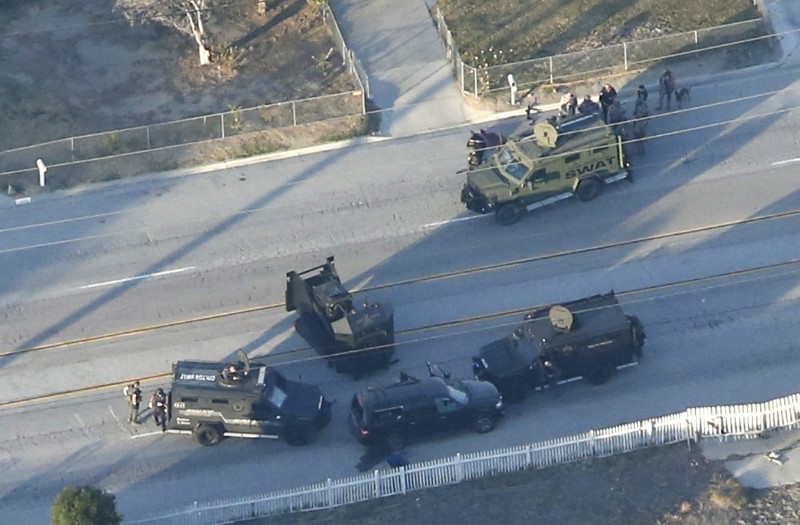
By Noah Browning and Aidan Lewis
DUBAI/TUNIS (Reuters) – The ostracism of Qatar by other powerful Arab states is deepening divisions between their respective allies vying for influence in wars and political struggles from Libya to Yemen.
The feud complicates efforts to stabilize countries reeling from years of turmoil and undermines the notion of a Sunni Muslim Arab world united against terrorism and Iran, proclaimed by U.S. President Donald Trump in his visit last month.
The quarrel is the latest chapter in the battle of wills between political Islamists and traditional Arab autocrats which has buffeted Muslim societies for decades.
Since the 2011 “Arab Spring” protests, which aspired to democratic reform but in several countries collapsed into warfare, Egypt and especially the United Arab Emirates emerged as main foes of an ascendant Muslim Brotherhood backed by Qatar.
After Saudi Arabia, Egypt and the UAE cut ties to Doha on Monday, accusing it of supporting militants and Iran, regional allies followed suit and denounced domestic foes as Qatari stooges, undermining reconciliation efforts by foreign powers.
“The whole situation has become very awkward. Qatar and its big rivals are fighting each other, but indirectly and on other people’s territory,” said Yemeni analyst Farea al-Muslimi.
“Having internal Arab messes like this escalate and get more complicated makes it pretty clear that the Arab world is far away from solving other issues like Palestine or Iraq or even the relationship with Iran.”
In Libya, the UAE and Qatar, which both played key roles in backing rebels in the uprising that toppled Muammar Gaddafi in 2011, have emerged as rivals on the battlefield with conflicting interests and visions.
The UAE, along with Egypt, has backed anti-Islamist former army commander Khalifa Haftar, appointed by a government and parliament based in the east. Qatar and Turkey have supported rival Islamist-leaning factions in western Libya.
In Yemen — mired in conflict since Saudi Arabia launched an air war in 2015 against the Houthi movement that controls the capital — a southern Yemeni secessionist council armed by the UAE opposes the internationally recognized government because it includes the Qatar-backed Muslim Brotherhood.
The council and Yemen’s Saudi-backed government, despite years of Qatar ties, cut diplomatic relations with Doha.
The eastern-based Libyan government and parliament aligned with anti-Islamist Haftar did the same.
“We are certain that the concerned states in the Gulf and Egypt will put pressure so as to drastically shift Qatar’s outrageous policies,” Mohamed Dayri, the foreign minister of the eastern government, told Reuters.
On Friday Saudi Arabia, the UAE, Egypt and Bahrain designated as terrorists five Libyans including Tripoli Grand Mufti Sadiq al-Ghariani, an influential figure for anti-Haftar militias in western Libya. They also listed the Benghazi Defence Brigades (BDB), a group that has tried to revive armed opposition to Haftar since last year.
TIME TO WITHDRAW?
Qatar has for years punched well above its weight in world affairs by parleying its vast gas wealth into influence across the region, irking the UAE and dominant Gulf Arab power Saudi Arabia with its maverick stances and support for Islamists.
Now, Qatar’s powerful neighbors appear to be demanding a retreat from those conflicts.
“The message now is that it’s time for Qatar to withdraw from the region and essentially not have an independent foreign policy,” said Peter Salisbury, an analyst at Chatham House.
“It looks like Saudi Arabia and the UAE won’t be satisfied until Qatar is pushed to stop funding the groups they don’t like, the Muslim Brotherhood and Hamas.”
But these demands come while Qatar’s allies have for the most part been forced onto the back foot.
Blessed by Saudi Arabia and the UAE, former Egyptian army chief and now president Abdel Fattah al-Sisi ousted the Qatar-aligned elected Islamist president Mohamed Mursi in a 2013 military takeover.
Palestinian Islamist group Hamas, some of its leaders based in Doha, is no closer to leading the Palestinian people then when it fell out with secular rivals in the Fatah party in 2007.
The Gulf spat is likely to further fuel inter-rebel conflicts in Syria, where rivalries between Qatar and Saudi Arabia have been showcased since the earliest days of the crisis.
“EXTREMIST DIVIDENDS”
Qatar’s friends who retain a plausible chance at national leadership, in Libya and Yemen, may have the most to lose from the row.
Haftar styles himself as a bane of extremism, and has become the dominant figure in eastern Libya since launching a campaign against Islamist groups and former rebels in Benghazi three years ago. Many suspect he seeks national rule.
His supporters believe the Qatar spat vindicates their anti-Islamist stance, as Haftar has gained ground and the U.N.-backed Tripoli government that he has rejected has been floundering.
Any hardening of the Haftar camp’s stance could complicate mediation efforts by Libya’s neighbors to the west, Algeria and Tunisia, which have been pushing for an inclusive, negotiated solution.
“Qatar being made an example out of … means that Haftar, Egypt and the UAE will experience much less diplomatic pushback as they ramp up their military campaign inside Libya itself,” said Jalel Harchaoui, a researcher at Paris 8 University.
(Editing by Samia Nakhoul)







